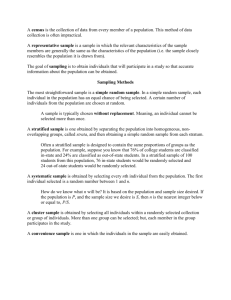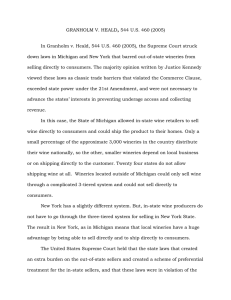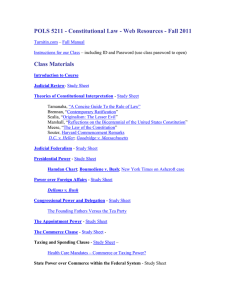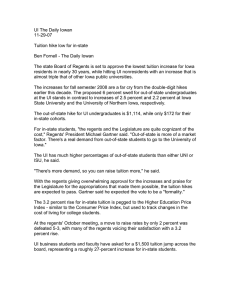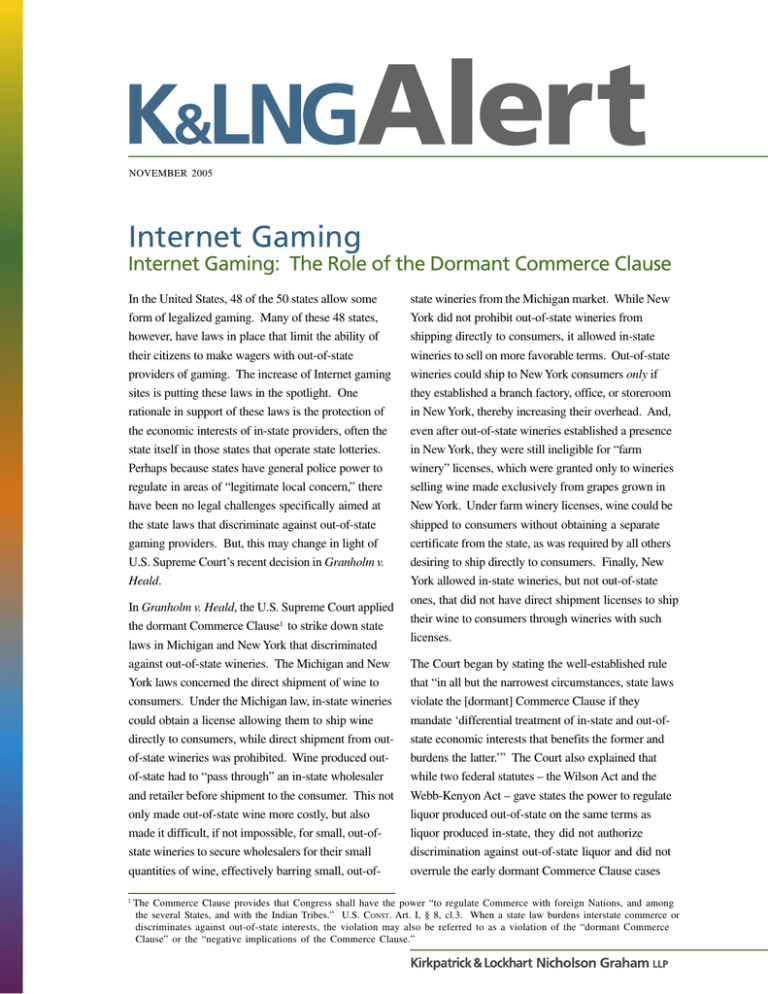
NOVEMBER 2005
Internet Gaming
Internet Gaming: The Role of the Dormant Commerce Clause
In the United States, 48 of the 50 states allow some
form of legalized gaming. Many of these 48 states,
however, have laws in place that limit the ability of
their citizens to make wagers with out-of-state
providers of gaming. The increase of Internet gaming
sites is putting these laws in the spotlight. One
rationale in support of these laws is the protection of
the economic interests of in-state providers, often the
state itself in those states that operate state lotteries.
Perhaps because states have general police power to
regulate in areas of “legitimate local concern,” there
have been no legal challenges specifically aimed at
the state laws that discriminate against out-of-state
gaming providers. But, this may change in light of
U.S. Supreme Court’s recent decision in Granholm v.
Heald.
In Granholm v. Heald, the U.S. Supreme Court applied
the dormant Commerce Clause1 to strike down state
laws in Michigan and New York that discriminated
against out-of-state wineries. The Michigan and New
York laws concerned the direct shipment of wine to
consumers. Under the Michigan law, in-state wineries
could obtain a license allowing them to ship wine
directly to consumers, while direct shipment from outof-state wineries was prohibited. Wine produced outof-state had to “pass through” an in-state wholesaler
and retailer before shipment to the consumer. This not
only made out-of-state wine more costly, but also
made it difficult, if not impossible, for small, out-ofstate wineries to secure wholesalers for their small
quantities of wine, effectively barring small, out-of1
state wineries from the Michigan market. While New
York did not prohibit out-of-state wineries from
shipping directly to consumers, it allowed in-state
wineries to sell on more favorable terms. Out-of-state
wineries could ship to New York consumers only if
they established a branch factory, office, or storeroom
in New York, thereby increasing their overhead. And,
even after out-of-state wineries established a presence
in New York, they were still ineligible for “farm
winery” licenses, which were granted only to wineries
selling wine made exclusively from grapes grown in
New York. Under farm winery licenses, wine could be
shipped to consumers without obtaining a separate
certificate from the state, as was required by all others
desiring to ship directly to consumers. Finally, New
York allowed in-state wineries, but not out-of-state
ones, that did not have direct shipment licenses to ship
their wine to consumers through wineries with such
licenses.
The Court began by stating the well-established rule
that “in all but the narrowest circumstances, state laws
violate the [dormant] Commerce Clause if they
mandate ‘differential treatment of in-state and out-ofstate economic interests that benefits the former and
burdens the latter.’” The Court also explained that
while two federal statutes – the Wilson Act and the
Webb-Kenyon Act – gave states the power to regulate
liquor produced out-of-state on the same terms as
liquor produced in-state, they did not authorize
discrimination against out-of-state liquor and did not
overrule the early dormant Commerce Clause cases
The Commerce Clause provides that Congress shall have the power “to regulate Commerce with foreign Nations, and among
the several States, and with the Indian Tribes.” U.S. CONST. Art. I, § 8, cl.3. When a state law burdens interstate commerce or
discriminates against out-of-state interests, the violation may also be referred to as a violation of the “dormant Commerce
Clause” or the “negative implications of the Commerce Clause.”
that struck down discriminatory state laws. The Court
went on to reject the argument that the 21st
Amendment, which repealed prohibition and provided
for state regulation of liquor, displaced Commerce
Clause restrictions with respect to state liquor laws.
The 21st Amendment did not give states the power to
pass non-uniform laws that discriminate against outof-state goods.
The Granholm Court then considered whether the
regulatory schemes in Michigan and New York
advanced legitimate state purposes that could not be
served by reasonable nondiscriminatory means. The
states’ claim that limiting out-of-state, direct shipment
of wine decreased the risk of underage drinking failed
because the states provided insufficient evidence of
the problem. The Court also pointed out that there are
less restrictive means of preventing underage
drinking, such as requiring an adult signature upon
delivery. Moreover, the discriminatory aspect of the
laws was not justified because minors are just as likely
to order a direct shipment of wine from an in-state
winery as from an out-of-state winery. Similarly, the
Court rejected tax evasion as a justification, because it
saw no difference between in-state and out-of-state
direct shipping in the potential for tax evasion. Other
rationales such as protecting the public’s health and
safety, ensuring regulatory accountability, and
facilitating orderly market conditions failed because
they could be achieved through an evenhanded
licensing scheme.
In sum, Michigan and New York failed to meet their
burden of showing that the discrimination against outof-state commerce was justified, because
nondiscriminatory alternatives were available for
policing direct wine shipments. As a result, despite
the states’ broad power to regulate liquor under the
21st Amendment, the Court struck down the Michigan
and New York laws because they discriminated against
out-of-state interests in violation of the dormant
Commerce Clause.
2
The arguments presented by Michigan and New York
in the Granholm decision are similar to the arguments
often advanced regarding the legitimacy of state
regulation of out-of-state gaming. The effect of
provisions that prohibit a state’s citizens, i.e.,
consumers, from placing wagers out-of-state is to
restrict the opportunities of gaming interests located
out-of-state in favor of protecting in-state gaming
interests. Under traditional dormant Commerce
Clause principles when examined in the light of the
Granholm decision, efforts to limit the ability of instate gamblers to place out-of-state wagers may well
be subject to challenge.
The impact of the Granholm decision on state gaming
regulations is particularly important because of the
Supreme Court’s interpretation of the Michigan and
New York statutes in light of the 21st Amendment.
Gaming, like alcohol, is an area that has been largely
left to the states to regulate under their inherent police
power. Because of this, states have passed laws
concerning gaming, without considering whether the
law discriminates against out-of-state interests. But in
Granholm, the Court concluded such was not
constitutional. The Court explained that although the
21st Amendment gives states the right to regulate
alcohol, it does not give them the right to pass laws
that discriminate against out-of-state alcohol. Based
on Granholm, a court faced with a challenge to an
alleged discriminatory gaming law could find that a
state’s right to regulate gaming also does not include
the right to enact discriminatory laws and would
evaluate any such challenge using traditional dormant
Commerce Clause analysis.
Under the traditional dormant Commerce Clause,
Nevada’s gaming law, Nevada Revised Statutes
(“NRS”) §§ 465.091 – 465.094, is an example of one
that would be likely not to pass scrutiny. This law
essentially makes it illegal for out-of-state
establishments to accept bets from citizens in
Nevada.2 It prohibits persons or entities from
The law includes wagers placed on the Internet. See NRS § 465.091.
accepting wagers from any person physically present
in the state of Nevada unless (1) the wager is placed by
an individual; (2) the wager is placed with a race or
sports pool licensed by Nevada, a person licensed by
Nevada to engage in off-track, pari-mutuel wagering,
or a person or establishment licensed under Title 41
(Gaming, Horse Racing, Sporting Events) of NRS; and
(3) the wager is accepted or received within the state
of Nevada. Although Nevada has a legitimate interest
in policing the safety and trustworthiness of the
gaming activities in which its citizens participate, it
cannot provide protection by discriminating against
out-of-state businesses. Like the Michigan and New
York laws providing favorable treatment to in-state
wineries, the Nevada law provides favorable treatment
to in-state gaming establishments by eliminating outof-state competition. Nevada would likely have a
hard time justifying this law as the least restrictive
means to protect its citizens when it could employ
other nondiscriminatory alternatives, such as an
evenhanded licensing scheme, to accomplish the same
result.
New York and New Jersey law regarding wagers on
horse racing are also suspect. New York racing law
allows only tracks located in-state to accept wagers
from New York citizens. NY Rac. Pari-M. §1012. New
Jersey law requires that “no entity, other than the
account wagering licensee, shall accept an account
wager from a person within this State.” (N.J. Stat.
§ 5:5-142 (2005)). Under the law in both states,
betting on horse races is legal both on and off-track.
Additionally, federal law provides that under the
Interstate Horse Racing Act, betting on horse races
between states is legal so long as both states allow
betting on horse races. Although legal in-state, the
laws of both states make it illegal for an off-track
betting establishment located out-of-state to accept a
wager placed by a resident of New York or New Jersey,
respectively. As with the Nevada law, both New York
and New Jersey will likely face dormant Commerce
Clause challenges based on the refusal to allow their
citizens to place wagers with companies licensed and
located in other states.
A state’s argument that federal statutes such as the
Wire Act, the Johnson Act, and the Transportation of
Gambling Devices Act were passed specifically to
assist the states in regulating gambling and, therefore,
Congress has explicitly recognized the preeminent
state interests in controlling gambling will likely also
face scrutiny. As the Court explained in Granholm
when that argument was made with respect to the
Wilson Act and the Webb-Kenyon Act, the extension
of the right to regulate to the states does not equate to
a right to discriminate against out-of-state gambling
interests and does not overrule general Commerce
Clause principles. As a result, courts facing a
challenge to legislation prohibiting in-state
consumers from wagering out-of-state will have to
determine whether the legislation advances a
legitimate state interest that cannot be served by less
discriminatory means. The states will likely argue that
such legislation advances a local interest in protecting
citizens from placing wagers with disreputable
entities, in ensuring that underage gambling is not
taking place, and in maintaining regulatory control of
the entities accepting wagers. While these may be
legitimate and valid concerns, states that permit instate gaming will have to show that these interests are
furthered by restricting wagers to in-state activities
and that there are no less discriminatory means
available to address these concerns. Absent the
showing of a legitimate state interest, the laws in the
states that prohibit citizens from engaging in the same
activity through out-of-state providers as they are able
to engage in in-state may likely be challenged under
the dormant Commerce Clause.
The Granholm decision’s most obvious implications
in the gaming realm are in cases where state
authorities choose to license some form of gambling
in-state while also attempting to prohibit its citizens
from engaging the services of out-of-state providers.
This contradiction currently exists in the area of parimutuel account wagering. Although many states
authorize off-track entities located and licensed instate to accept wagers from in-state citizens, they make
it a crime for out-of-state entities to accept the same
wagers from in-state citizens. Account wagering
entities operating out-of-state may likely seek
declaratory relief regarding the constitutionality of
such laws, or assert the dormant Commerce Clause as a
defense in an action by the Attorney General of one of
these states alleging violations of these laws.
providers will likely face dormant Commerce Clause
challenges. Although the potential in-state revenues
will certainly motivate states to try to keep gaming instate, under current federal precedent, the
constitutionality of such conduct remains
questionable.
Additionally, because of the number of states
considering legislation regarding Internet gaming,
the same analysis will likely apply in that area in
the coming years. Legislation that legalizes on-line
gaming by citizens with in-state providers while
criminalizing the same conduct with out-of-state
Ashley J. Camron
If you have questions or would like further
information, please contact:
Linda J. Shorey
lshorey@klng.com
717.231.4510
acameron@klng.com
310.552.5092
Amy L. Groff
agroff@klng.com
717.231.5876
Dennis M.P. Ehling
dehling@klng.com
310.552.5090
www
w.. k l n g . c o m
BOSTON DALLAS HARRISBURG LONDON LOS ANGELES MIAMI NEWARK NEW YORK PALO ALTO PITTSBURGH SAN FRANCISCO WASHINGTON
■
■
■
■
■
■
■
■
■
■
■
Kirkpatrick & Lockhart Nicholson Graham LLP (K&LNG) has approximately 1,000 lawyers and represents entrepreneurs, growth and middle market companies, capital markets participants,
and leading FORTUNE 100 and FTSE 100 global corporations nationally and internationally.
K&LNG is a combination of two limited liability partnerships, each named Kirkpatrick & Lockhart Nicholson Graham LLP, one qualified in Delaware, U.S.A. and practicing from offices in
Boston, Dallas, Harrisburg, Los Angeles, Miami, Newark, New York, Palo Alto, Pittsburgh, San Francisco and Washington and one incorporated in England practicing from the London office.
This publication/newsletter is for informational purposes and does not contain or convey legal advice. The information herein should not be used or relied upon in regard to any particular
facts or circumstances without first consulting a lawyer.
Data Protection Act 1988 - We may contact you from time to time with information on Kirkpatrick & Lockhart Nicholson Graham LLP seminars and with our regular newsletters, which may be
of interest to you. We will not provide your details to any third parties. Please e-mail cgregory@klng.com if you would prefer not to receive this information.
© 2005 KIRKPATRICK & LOCKHART NICHOLSON GRAHAM LLP. ALL RIGHTS RESERVED.

